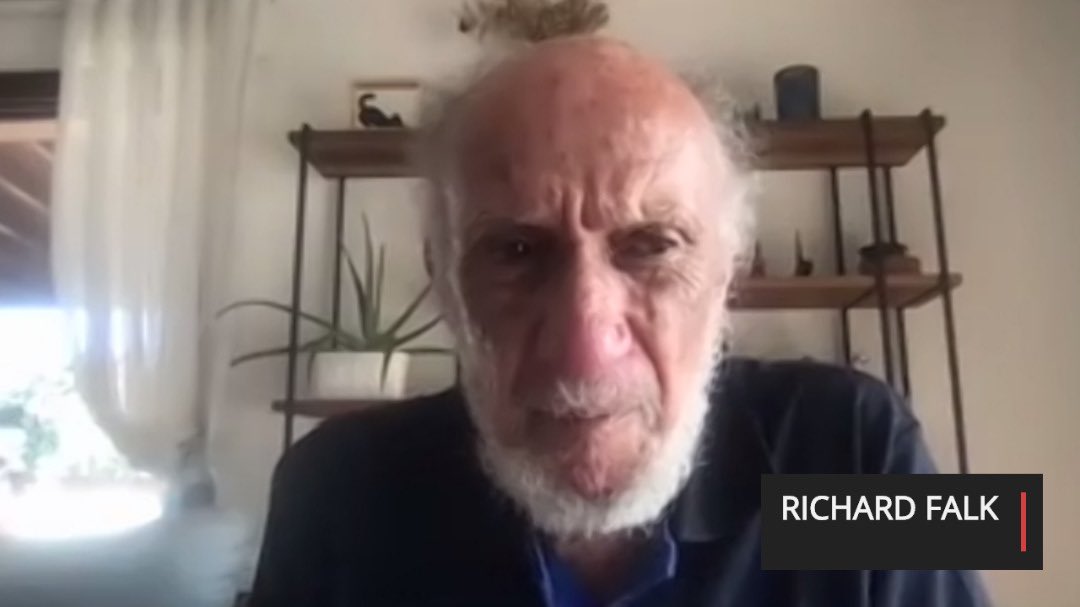Richard Falk, professor emeritus of international law at Princeton University and former UN Special Rapporteur on the situation of human rights in the Palestinian territories occupied since 1967, participated on Wednesday in the international academic conference “Unilateral Measures: Disrespect for International Right, Serious Human Consequences.”
In this space for debate, organized by the Venezuelan Government and the Geneva School of Diplomacy and International Relations, Falk presented a paper titled “Divine judgement of postcolonial imperialism, unilateral sanctions,” where he clearly establish a difference between hegemonic international law and counter-hegemonic international law to show that the world’s justice system was created to respond to the wishes of the most powerful countries.
Falk explained that this dynamic enables governments such as the United States to exert pressure with blockades, sanctions and other measures, alleging legitimate defense and using the Charter of the United Nations and its right to veto at the Security Council to its favor.
From Falk’s perspective, coercive measures “violate the spirit and content of International Law. It’s particularly impressive that Venezuela is takin this initiative as it has had International Law on its side for a long time, but it has not helped them much. Maybe, in my opinion, they reached the conclusion that it is futile, that a country targeted by this type of coercion gets involved in international law and advocates for it.”
According to the human rights expert, the difference between hegemonic and counter-hegemonic international law is that the former assumes violations against people as acts of justice.
On the contrary, “counter-hegemonic international law […] is the idea that an effective change is also the result of controlling the symbolic relation linked to the norms; not the behavioral connection, but the symbolic relation. If we talk about anticolonial wars, we can see it more clearly. The weakest side, from the military point of view, won wars because they controlled the symbolic scope of law and morality. This built support in terms of political will and global solidarity.”
Likewise, Falk asked why countries like Iran, Cuba, Venezuela and Palestine have the law on their side, but are still victimized by international behavior.
“It is clear that the United Nations is ambivalent as for what type of international law it wants to refer to and with which it identifies. This ambivalence is enshrined in the Chart when it talks about the privileges of geopolitical actors in terms of veto power and the permanent membership in the Security Council,” explained Falk.
According to Falk, “the veto power conveys that the most powerful countries, like in 1945, are excepted from international law if they decide so. They are excepted from the Chart and its application. They are not held accountable. They have the power. They are empowered to not to be held accountable.”
Therefore, they can block the constant demands of Venezuela, Cuba, Iran and other nations for the lifting of unilateral coercive measures.
“The UN is important from a symbolic point of view; it legitimates the claims of countries like Venezuela, but it cannot correct, nor meet those claims because it is opposed by countries with the capacity of blocking the use of norms. So, it is not surprising that sanctions have been almost exclusively applied by former colonial powers and the United States,” Falk stated.
According to the expert, the punishing actions of these governments gain importance as they use international law and coercive measures as imperial weapons.
“Sanctions are basically a discretional weapon within the framework of hegemonic international law, and they are sometimes a sinister weapon,” said Professor Falk.
“We are dealing with what I call a grey zone of international law that can be manipulated in ways that reflect the precedence of geopolitics […] The system was designed this way. It’s not that it’s not working; it’s working as it was planned. Otherwise, the veto would not have sense. Why do the weakest countries have to be held accountable while the strongest don’t? This fundamental incoherence is the one found in this grey zone,” he stressed.



